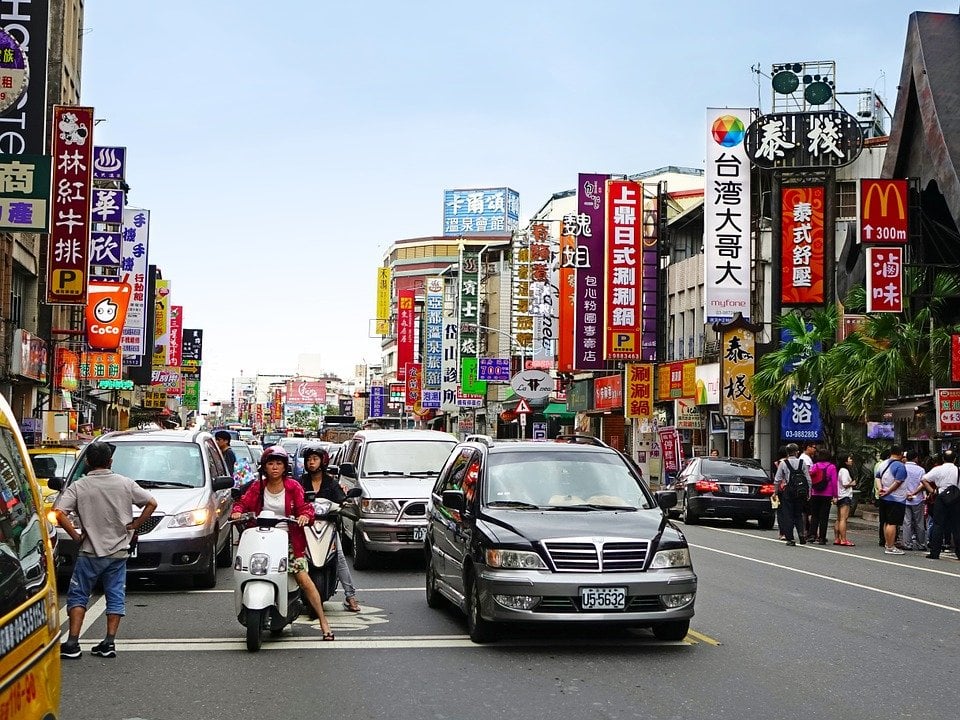What to Know About Teaching Abroad in Different Chinese-Speaking Regions
It can be impossible to know where to start, so read on to find out what you should know about teaching abroad in different chinese-speaking regions!

You've decided: you want to teach abroad in China. But what exactly does that mean? For most, teaching abroad in China means working on the Mainland, but there are other Chinese-speaking locations in the region to consider.
Hong Kong and Taiwan are nearby regions that, while culturally and politically distinct, share Mandarin and Cantonese as the primary spoken languages. These fantastic islands have a lot to offer, and shouldn't be forgotten when looking for jobs in a Chinese-speaking country.
If you do decide you want to teach on the Mainland, where should you focus your energy? Should you apply for jobs in the big cities like Shanghai, Beijing, and Shenzhen? What about the smaller "second-tier" cities like Nanjing, Hangzhou, Xi'an, and Chengdu? How about the tiny cities and rural areas?
With so many locations to choose from, it can be impossible to know where to start. That's why today I'm comparing all of them.
It's not just Hong Kong vs. Taiwan vs. Mainland China. Instead, we discuss the similarities and differences between Hong Kong, Taiwan, and Mainland China, including the big cities, second-tier cities, and the rural areas.
Get ready, because we're about to go really in depth.
Similarities Between the Chinese-Speaking Regions

To be honest, all of these regions have more similarities than differences. They have many of the same job opportunities and requirements, along with similar work environments.
It wouldn't make sense to discuss the differences until we understand what's similar. So first let's go over the major commonalities between all five locations.
1. Teaching Requirements
Generally, Hong Kong, Taiwan, and Mainland China have the same visa requirements. You'll need to be a native English speaker with a bachelor's degree. Mainland China is the only country that officially requires a TEFL certificate, however, you'll find that across Hong Kong, Taiwan, and Mainland China, the same policy applies: While it's possible to find jobs in all three locations without a TEFL, it is much easier to find a good job with one.
Wait... how can you apply for a job in Mainland China without a TEFL? More on that later.

2. Good for Saving Money
While salaries differ across all the regions, generally Hong Kong, Taiwan and all of Mainland China have a plethora of jobs that will allow you to save money. Unless you go crazy, partying till dawn in Hong Kong's nightclubs, or splash out on too many fancy Western meals in China's smaller cities, you'll typically be able to save a decent bit of money after a year teaching abroad.
When you're looking at salaries across these areas, be sure to compare salary to cost of living. You'll obviously make more in cities like Beijing and Shanghai than you would teaching in a small rural town. However, this merely compensates for the higher cost of living in these cities.
3. More Jobs Than Teachers
All of these areas are desperately seeking teachers to compensate for their ever-expanding English-language market. If you have the necessary requirements, you won't have any difficulty landing a job in any of these locations, even with absolutely zero teaching experience.
The Major Differences Between Chinese-Speaking Regions
Now that we've gotten the similarities out of the way, let's talk about some of the fundamental differences between teaching abroad in these various regions. Hopefully, this will help you narrow down a specific area to look for a position.

1. Types of Available Positions
While there are plenty of available positions all throughout these various regions, the types of positions vary from place to place. In Hong Kong, your main options are working for the government-sponsored NET program at a Hong Kong public school, or you may want to work in a private language center.
The NET program is just like the JET program in Japan or the EPIK program in Korea. You'll be placed in a Hong Kong public school where you may or may not be the only foreign teacher. If you work in a private language center, you'll typically be teaching school-aged children English courses on the weekends and evenings.
Read More About Teaching Jobs in Hong Kong
In Taiwan, most first-year teachers end up working for a Buxiban cram-school. These are for-profit after-school language training centers that actively recruit teachers to educate their ever-expanding pool of students. After a year at a Buxiban, most teachers move to smaller, higher-paid training centers and some even establish centers of their own!
Read More About Teaching in Tawian
In Mainland China, you'll be able to find just about every type of teaching position imaginable. Most teachers work either for either after-school language academies or Chinese public schools. While language academy jobs are the easiest to find online, there are plenty of public and private schools hiring for oral-English teachers too.
2. Working with Recruiters
Recruiters can be a great way to find a job in China, however, not every job or location tends to use them. For example, using a recruiter is by far the best way to get a job in Taiwan. Why not utilize a free resource who will not only help you get a job in Taiwan, but also prepare you for the move?
However, recruiters have yet to gain any sort of popularity in Hong Kong, where most jobs are found either through the NET program or job forums online.
Finally, recruiters in Mainland China enjoy a medium-level of popularity. While many teachers decide to apply to jobs through forums online, others go through a recruiter. Personally, I think working with a recruiter is a great way to get a job at a public or private school in China. Just be sure your recruiter is reputable with good reviews online!
3. Salary
Obviously, salaries differ depending on the area you teach. The highest salary range is unsurprisingly found in Hong Kong, where the average salary is roughly $1,800-$2,300 USD per month. Second on the list belongs to Mainland China's larger cities like Beijing, Shanghai, and Shenzhen. Here you'll find salaries ranging from 10,000-15,000 RMB ($1,400- $2,200 USD) with free housing or a housing stipend.
In Taiwan, you'll find that most jobs pay around $600 NT per hour, which equates to around $2,000 USD per month. A Mainland second-tier city typically pays roughly 8,000-12,000 RMB ($1,200- $1,800 USD). Finally, the lowest salaried jobs will be found in rural Mainland China. You should expect to make between 6,000 - 8,000 RMB ($900- $1,200 USD).

4. Cost of Living
Just as the average salary differs between each of these locations, the cost of living varies drastically as well. Hong Kong is by far the most expensive place to live out of the various Chinese regions, and your largest cost well most definitely be rent. Rent prices in downtown Hong Kong island can start around $1,300 USD a month, meaning most teachers decide to share an apartment or commute to work in order to make life affordable.
Beijing, Shanghai, and Shenzhen are definitely the most expensive group of cities after Hong Kong. I was absolutely shocked when I moved to Beijing from Ningbo; everything was twice the price! You can expect to pay around $800-$1,200 for your own apartment, which is why most positions in these cities provide housing on campus or give you a housing stipend. Be aware that most housing stipends only cover a room in a shared apartment, rather than the cost of a studio or one-bedroom. Foreign goods and Western food are also pretty pricey on the Mainland, and may cost you more than what you'd pay in Hong Kong!
Taiwan's major cities are slightly cheaper than Beijing and Shanghai, which was also a bit surprising to me. Not only is rent in cities like Taipei and Kaohsiung half the price of what you'd pay in Beijing and Shanghai; food, fresh fruit, and national park fees are very cheap! Taiwan is also a haven for foreign food and goods compared to the Mainland. You can grab a cup of coffee for less than $1 USD at 7-11!
Finally, the cheapest places to live are Mainland China's second-tier cities and rural areas. When I lived in rural China I was able to eat at the school cafeteria for $1 USD, and my average bus cost into town was only $.50! Of course, I had a much lower salary to match the cheap cost of living.
5. Teaching Legally
Don't have a college degree? Not a native speaker? While it is possible to find jobs in Taiwan and Hong Kong without all of the requirements, your best bet for finding a decent position is definitely Mainland China. Not only are the Mainland's second-tier cities and rural areas much more lax on teaching requirements, China's major cities contain hundreds of teaching academies that can't afford to hire someone with all of the requirements.
Remember how a TEFL certification is optional but helpful in all of the Chinese-speaking regions? Now you have your answer: You need a TEFL to teach legally in China, but many places will hire you without one. However, I personally recommend getting a TEFL no matter where you teach because you'll often receive a higher salary. If you consider in the fact that you can easily get a TEFL online for around $200 USD, obtaining a TEFL can be a very wise investment.
6. Government-Sponsored Programs
Hong Kong is the only location in the Chinese-speaking region that has a government program akin to EPIK and JET. The NET program is an incredible option if you're thinking of teaching in Hong Kong, and is also the best way to get a job at a Hong Kong public school.
If you're looking for a reputable program run by the government, NET is the only choice you have in China.

7. Available Amenities From Home
One important thing to consider when choosing a location is the number of available amenities and comforts from home. Overall, Hong Kong is the best place for foreign foods and goods and is also pretty affordable in this regard. However, it can be a bit too easy to blow your entire budget on a night out or by eating all your meals in Hong Kong's fancy Western restaurants.
Taiwan is also incredible for access to foreign foods and products at reasonable prices. Obviously, the best places for experiencing the comforts of home are Taipei and Kaohsiung, but you can find great food and products all over the country. 7-11 is everywhere, and I had some of the best pizza in my entire life in the surfing village of Dulan near Taitung.
Finally, Mainland China is the worst of the three for foreign goods and products. While you can find just about anything you want in Beijing and Shanghai, foreign foods and products are easily 3-4 times the prices of an average meal of Chinese food. Mainland China also has heavy import taxes, meaning you'll probably want to stock up on all your favorite products from home before you go.
Outside of the major cities, it can be hard to get good Western food and foreign products. While larger second-tier cities like Nanjing, Hangzhou, and Chengdu aren't too bad, I rarely had a decent Western meal in Ningbo. When I lived in the Chinese countryside, I could ride my e-bike 30 minutes to the local KFC and that was about it.
8. Chinese Language
While all of these regions speak "Chinese", not all of them speak the standard form of Mandarin you might have learned in school. While Mainland China and Taiwan speak Mandarin Chinese, Hong Kong and the Southern parts of the Mainland (Guandong province) speak Cantonese. Many people call Cantonese a dialect of Chinese, but the truth is that Cantonese and Mandarin are two completely different languages.
In addition to spoken differences, China also has two different types of writing: Traditional and Simplified. Hong Kong and Taiwan both use traditional characters, while the Mainland uses a simplified version. This means that if someone in Taiwan were to write something down, a person in Mainland China wouldn't be able to read it, whereas a person in Hong Kong would, even though they speak two different languages. Crazy, right?!
Finally, if you're planning on teaching outside of the major cities, you'll have to be aware of the many dialects in Mainland China. Here you'll find Shanghaihua, Ningbohua, Sichuanhua, Xi'anhua and more. While this isn't too big of an issue in the cities where most people can speak Mandarin, it was a huge problem for me when I lived in a rural area. Everyone could understand my Mandarin, but I couldn't understand what any of the locals were saying!
Finally, you'll want to consider the English level of the place that you're teaching abroad. While many locals in Hong Kong speak English, not many people in the Chinese countryside even speak Mandarin, let alone English! By far the best level of English comprehension I've found has been Hong Kong, followed by the major Taiwanese cities. Beijing and Shanghai are slightly behind their island counterparts, while the second-tier cities and small towns lag far behind.
Whats the Best Place for You?
There are so many types of positions and locations within the Chinese-speaking world, you'll have plenty of jobs to choose from. Hopefully, this guide gave you a better idea of where you should teach abroad, whether it's a Mainland Chinese village or downtown Hong Kong.
If you're still a little unsure of where you belong, be sure to have a look at our individual job pages for Hong Kong, Taiwan, and Mainland China to get a better idea of the job opportunities and lifestyle you may expect when teaching abroad in a Chinese-speaking location.
